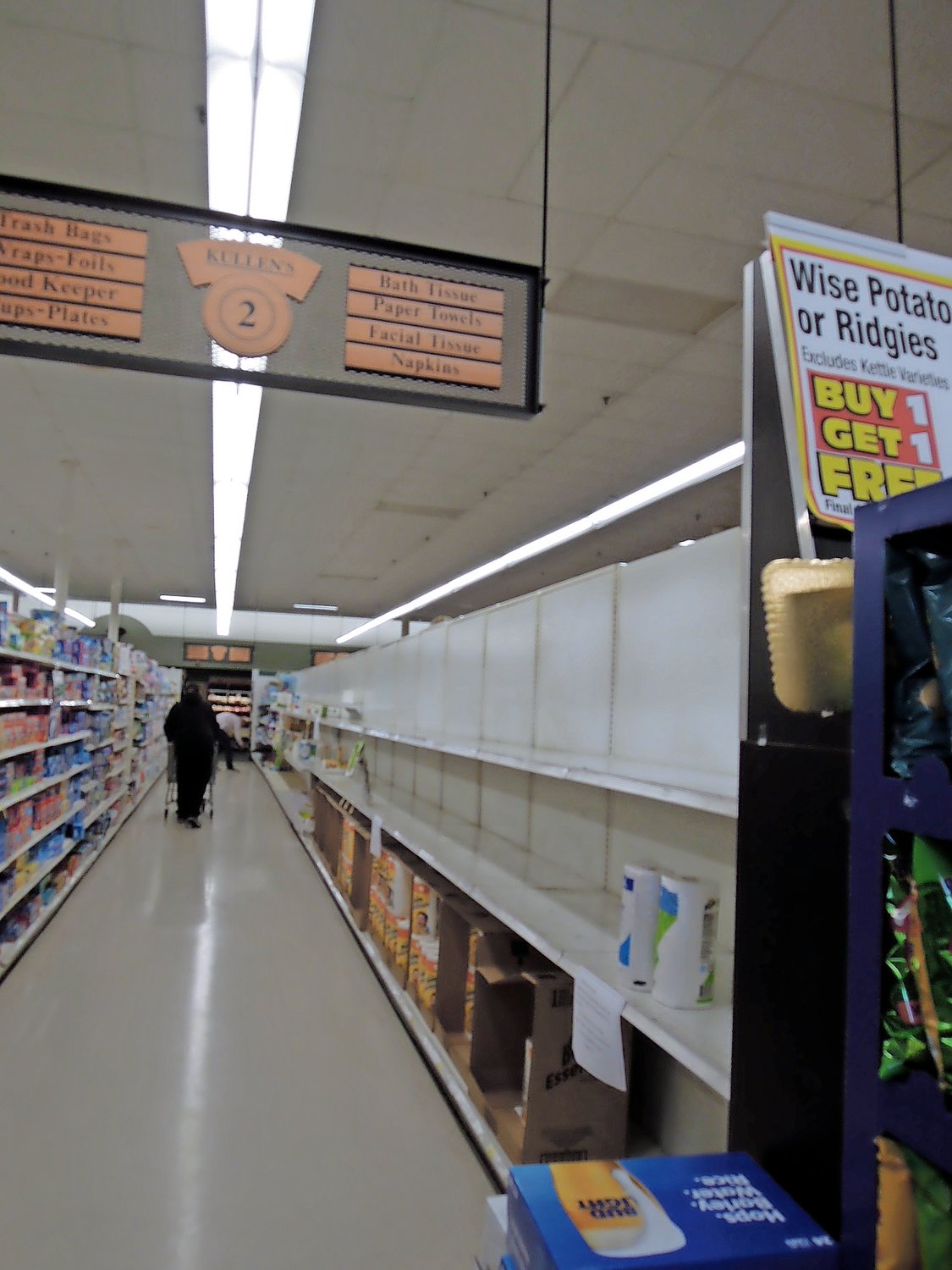Residents veer between panic and prudence
It was 7:30 on Monday morning, and Douglas MacArthur High School and its neighbor, Jonas E. Salk Middle School, were deserted. Normally, monitors direct traffic as parents drop off their children and student drivers look for parking spaces. Old Jerusalem Avenue, one of the streets that provide access to the school, is backed up bumper-to-bumper as last-minute arrivals try to get in by the bell.
On March 11, a staff member at Gerald R. Claps Career and Technical Center, or GC Tech, tested positive for the coronavirus, and because the Levittown district sends students to GC Tech, the result triggered state Department of Education protocols, and MacArthur and Salk were closed on Friday.
A student from Wantagh High School had also tested positive on Wednesday, and all the schools in that district were likewise shuttered on Friday.
Both districts had expected to resume classes by the beginning of this week, after deep cleaning their facilities, according to a letter to parents from Wantagh Superintendent John McNamara. On Sunday, however, County Executive Laura Curran shut down all of the county’s 54 districts, after consultations with Gov. Andrew Cuomo, and schools now must make the transition to online instruction.
“I’m glad the schools are closing,” said MacArthur senior Kerri Ferris, 17. “I already have a weak immune system. If I got the virus, I could die.”
Ferris expected to continue her studies remotely at some point, and didn’t anticipate that it would interfere with her graduation plans.
Schools were only part of the picture, as residents of Seaford and Wantagh learned to cope with the silent menace of the virus. Grocery stores were plundered of their paper goods, and by Friday, toilet paper was almost not to be had. Paper towels and facial tissues were similarly snapped up by a panicky public, and empty shelves at King Kullen and Stop & Shop bore witness to residents’ uncertainty about what they were facing and for how long.
Shopping carts were piled high with chicken, ground beef and juice; even unusual items, like kefir, were in short supply.
“It’s crazy,” an employee of one chain grocery said, asking that her name and that of her employer be withheld. “I just bought a couple of extra rolls of toilet paper and some juice and a few extra bottles of seltzer.” But she was confident, she said, that the store’s regular deliveries would replenish most of its stock by the beginning of the week, and that shortages would be temporary.
Other closures included senior centers, the Wantagh center on Seamans Neck Road among them. Hempstead Town Superior Donald Clavin had said last week that the centers would remain open. Attempts to reach the center were unsuccessful at press time.
Before the countywide school cancellation was announced, after-school activities were called off. Twelve Seaford High School students whose work had been selected for display at Farmingdale State College on Sunday were disappointed to learn that the exhibition was off. “We’re disappointed, too,” said the college’s media spokesman, Peter Crescenti.
But in declaring a state of emergency on Friday, Gov. Andrew Cuomo banned all events with more than 500 attendees, and he revised that number down to 50 on Monday.
Churches’ responses were varied. The Islamic Center of Long Island, in Westbury, canceled its regular Friday Jumah services, and Masjid Al-Baqi, in Bethpage, did likewise. Roman Catholic services continued as scheduled, but with some adjustments. The chalice containing wine representing the blood of Christ was to be reserved for the clergy, the normal practice until the Vatican II Council. And the sign of peace — usually a handshake and greeting — was dispensed with until the crisis passes, according to instructions to the parishes from the Bishop John Barre of Rockville Centre.
Eastern Orthodox churches continued to offer communion in the usual manner — by spoon. Diocesan Archbishop Michael (Dahulich), of the Orthodox Church in America, left it to individual parishes to make whatever adjustments met their needs, but stressed his desire that Lenten liturgical observances continue uninterrupted as long possible.
At East Meadow’s Holy Trinity Orthodox Church, which serves parishioners from southeastern Nassau to Queens, the church’s rector, V. Rev. Martin Kraus, explained, “This isn’t just something that represents our Lord’s body and blood. We believe it is his actual body and blood, so it’s impossible for that to be corrupted.” But the church did make other changes, including discontinuing its weekly bulletins and serving food at post-liturgy fellowship gatherings.
Holy Trinity is one of three Orthodox churches in the New York diocese that streams its liturgy online.
Local businesses were beginning to feel the pinch, too, Wantagh Chamber of Commerce President Cathy McGrory Powell said. “It’s hitting some businesses especially hard — bars and restaurants — service businesses,” she said before the governor’s Monday announcement closing the state’s bars and restaurants altogether, except for take-out and delivery. And following Cuomo’s guidelines on crowd limits, the chamber reluctantly postponed its second annual St. Patrick’s Day Parade.
Even 12-Step groups, often among the most resilient and resourceful during crises, were improvising, as the churches and schools that offer meeting spaces closed their doors to outside groups. Most found temporary solutions for the past week. Going forward, “we’ll try to find another meeting space,” said one longtime member of a local Alcoholics Anonymous group. Meanwhile, the group has set up conference calls and will meet by telephone, if necessary.






